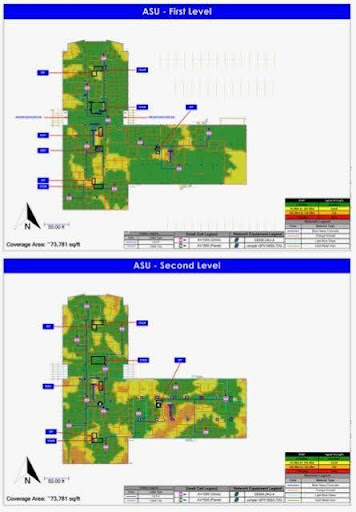Have you ever walked into a building and had your cell phone go from full service to only a few bars? Certain building materials – such as brick, thick concrete, metal or glass – can potentially be limiting for cellular signals.
One approach to solve this challenge is to refurbish the buildings – which is costly and disruptive. However, new advances in networking tools allow for technology to enhance connectivity without changing the building structure.
“Our neutral host network pilot is a testament to ASU’s forward thinking approach. It’s not just an improvement to cellular connectivity, it’s another step towards reimagining our campus infrastructure for the digital age,” shared Ryan Hendrix, partnership portfolio manager at ASU Enterprise Technology. “This early success signals a future where our University leads in creating a seamlessly connected community.”
The team behind the Cox Collaboratory at Arizona State University is piloting a potential technological solution: a Neutral Host Network-as-a-service (NaaS). In October 2023, ASU and Cox Private Networks (CPN), with CPN’s partner InfiniG, introduced this solution at ASU’s University Services Building (USB).
Standing at over 150,000 square feet, USB – part of the Tempe campus at ASU – houses a variety of departments core to the university. Such departments include Human Resources, Facilities Management, Financial Services, Purchasing and Business Services and Enterprise Technology — all units that are essential to the daily operations for ASU.
How it works
The Neutral Host pilot extends a cellular provider’s reach inside buildings. To do so, the team installed small radio nodes that operate on the Citizens Broadband Radio Service (CBRS) frequencies and utilize the existing local area network (LAN) infrastructure and broadband wired service to connect each mobile user to their service operator.
“Companies continue to face challenges with their in-building public cellular coverage and previously had limited ways to solve this problem,” said William Richmond, general manager at Cox Private Networks. “Using private network technology to enhance public cellular coverage enables us to provide companies of all sizes with a cost-effective solution that gives our customers back control over their network and enables the use cases of the future with public/private cellular hybrid solutions.”
This Neutral Host deployment has brought AT&T and T-Mobile — two major wireless national carriers — together with the goal of enhancing coverage inside the building so staff, students, and guests can make phone calls and access cellular data regardless of their location within the multi-story building
Positive outcomes = better service
 And the initial results are promising. Metrics from the pilot include: five bars of mobile coverage for AT&T and T-Mobile users, up from zero to one in most locations. The graphs below show that a strong signal is available throughout the building. Anything green or yellow is close to five bars, indicating strong signal strength and a good user experience that can be expected even while walking around the building. No need to stand near the window to make a call.
And the initial results are promising. Metrics from the pilot include: five bars of mobile coverage for AT&T and T-Mobile users, up from zero to one in most locations. The graphs below show that a strong signal is available throughout the building. Anything green or yellow is close to five bars, indicating strong signal strength and a good user experience that can be expected even while walking around the building. No need to stand near the window to make a call.
Additionally, testing showed that users are seeing an improvement in individual download speeds — up to five times as fast — from previous repeater based systems. Bandwidth and consistency of the experience both improved.
Educating the community on Neutral Host technology
ASU faculty and students are invited to attend a Private Networks / Neutral Host virtual workshop on Wednesday, March 27! In this workshop, members of the CPN and InfiniG teams will be educating members of the ASU community about Neutral Host technology and private networks to help the community become well versed in this ever-changing technological environment.
Many thanks to our partners at Cox Private Networks; learn more at CoxPrivateNetworks.com.